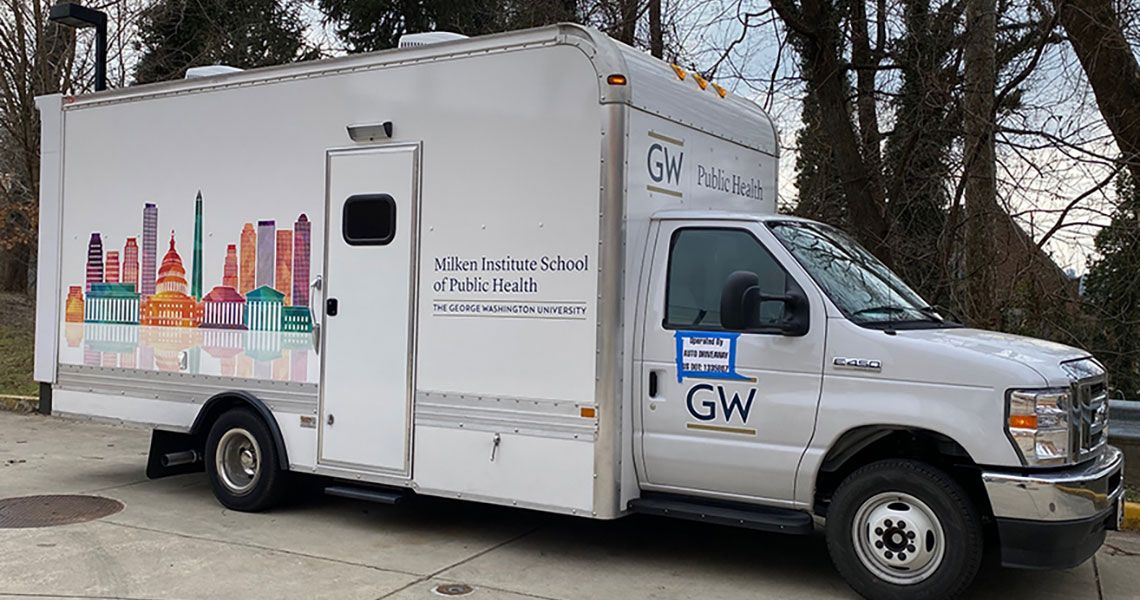A team of researchers from the George Washington University (GW) has been selected as one of five sites participating in the HIV Prevention Trials Network (HPTN) INTEGRA study (HPTN 094). The study, sponsored by the U.S. National Institute of Allergy and Infectious Diseases with funding from the U.S. National Institute on Drug Abuse, both part of the National Institutes of Health, will determine whether using mobile health units to deliver integrated health services can improve HIV and substance use outcomes among people with opioid use disorder who inject drugs.
Leading the GW research team is principal investigator Irene Kuo, PhD, MPH, associate research professor of epidemiology in the Milken Institute School of Public Health at GW, and co-investigator Marc Siegel, MD, associate professor of medicine at GW’s School of Medicine and Health Sciences, and leader of the NIH-funded GW HPTN Clinical Research Site, which operates under the recently-funded NIH-funded District of Columbia Clinical Trials Unit.
“The study focuses on offering integrated care for substance use, HIV care or prevention, and treatment for sexually transmitted infections, as well as referrals for care of viral hepatitis, especially hepatitis C,” explained Kuo. At the end of a 26-week period, Kuo added, researchers hope to see increased uptake of substance abuse treatment and medication for HIV prevention and care among study volunteers.
Overall, the INTEGRA study will enroll approximately 860 volunteers, between the ages of 18 and 60, in Houston; Philadelphia; the Bronx, New York; Los Angeles; and Washington, D.C. The volunteers must be people who inject drugs who do not currently receive medical treatment for opioid use disorder.
The GW team is looking to enroll a 172-person cohort from several locations in the city. Study participants will be randomly assigned to either the intervention group or an active control group. Intervention participants will receive integrated health services from the mobile health unit that includes HIV and hepatitis testing, prevention, and treatment services, as well as assistance from trained peer navigators to access health care and stay in treatment for opioid use. Those in the control group will be assigned to a peer navigation who will refer the participant to established services in the community-based services.
The study will determine whether a one-stop-shopping provision of integrated care will result in better outcomes versus a standard model of care.
“The hypothesis is that people with opioid use disorder have many barriers to care,” said Siegel. People who inject drugs, he added “tend to have other underlying medical conditions — HIV, sexually transmitted infections, diabetes, hypertension, mental health disorders — so when they get into an opioid treatment program, those other health care needs aren’t addressed.
“By bringing care out to where people are actually located, it will not only allow us to provide access to medication for opiate use disorder, but it will also allow us to address their other medical needs at the same time, particularly HIV. And if they are not HIV positive, we can provide them with pre-exposure prophylaxis, so that they don’t acquire HIV.”
“One of the most interesting aspects of the study is the offer of pre-exposure prophylaxis for people,” added Kuo. The CDC has issued recommendations for physicians to provide pre-exposure prophylaxis, or PrEP, to people who inject drugs, especially those who are needle sharing or are having sex with HIV-positive or unknown partners. However, it's a recommendation that doesn’t get acted on very often, according to Kuo. “That’s one really interesting element in the study; we will be proactively offering PrEP to our study participants.”
If the study volunteers test negative for hepatitis A and B, the team will refer the volunteers to be vaccinated because both diseases are at increased prevalence among people with opiate use disorder. If they test positive for hepatitis C, which is prevalent among people who inject drugs, the medical staff will refer them for treatment.
“Breaking down structural barriers to accessing health care is essential to improving outcomes,” said Steven Shoptaw, PhD, INTEGRA protocol co-chair and director of the Center for Behavioral and Addiction Medicine at the University of California, Los Angeles.
This study also looks to advance addiction science by determining the most effective way to integrate HIV care and prevention, opioid use disorder treatment, and other health care in a way that will overcome the barriers that prevent those most in need from accessing services. Participants enrolled in the study will be followed for one year. The results from overall study are expected in 2025.
Read more information about HPTN 094, or ClinicalTrials.gov using study identifier NCT04804072.



